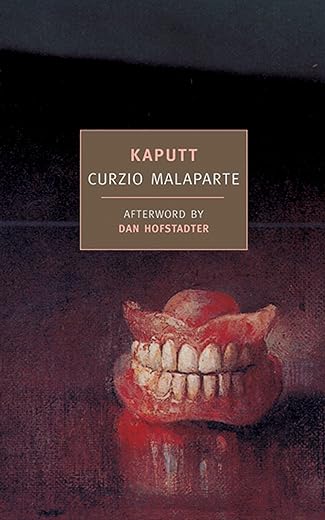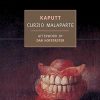Kaputt (New York Review Books Classics)
£11.40£12.30 (-7%)
Curzio Malaparte was a disaffected supporter of Mussolini with a taste for danger and high living. Sent by an Italian paper during World War II to cover the fighting on the Eastern Front, Malaparte secretly wrote this terrifying report from the abyss, which became an international bestseller when it was published after the war. Telling of the siege of Leningrad, of glittering dinner parties with Nazi leaders, and of trains disgorging bodies in war-devastated Romania, Malaparte paints a picture of humanity at its most depraved.
Kaputt is an insider’s dispatch from the world of the enemy that is as hypnotically fascinating as it is disturbing.
Read more
Additional information
| Publisher | NYRB Classics, Main edition (1 Mar. 2007) |
|---|---|
| Language | English |
| Paperback | 448 pages |
| ISBN-10 | 9781590171479 |
| ISBN-13 | 978-1590171479 |
| Dimensions | 12.7 x 2.36 x 20.24 cm |



by Shaun Spencer
The book is very well written. Interesting accounts of time in Mannerheim’s Finland with Agustin de Foxa. Wining, dining and conversing with the Nazi rulers of Poland.
by Nit Picker
The most decadent book I have ever read. Feasting and socialising during the first half of WW2, Malaparte encounters among others the self-styled “King of Poland”, the Nazi monster Frank.
by Hector Stanislaw De Garza
Malaparte visited the eastern theaters on the Axis side as a fascist war correspondent. With fatalistic almost clinical detachment Malaparte narrates his chronicles thinly disguised as a novel.
by Pillowtail
Malaparte was an opportunist, social climber, raconteur and political amateur. He was also a gifted writer. How much is truth in this book, and how much is not, is actually irrelevant if one accepts this as the particular document of a fickle man during the war. The book is a series of seemingly unrelated vignettes, his encounters with personalities, most of them reviled. Whether or not Malaparte actually met them, spoke with them as he relates or whether or not he changed his opinion of them as the war for Italy took a downward course is open to conjecture. What he did do however, was to add to the mythology of war and its horrors. Himmler in a Helsinki lift and later a white blob in a sauna, and a murderer; Hans Frank as a cultured pianist, and murderer; the wives, girlfriends, their table talk that comes around always to the murder of Jews.
Kaputt is the title and the meaning is the destruction and end of European “Culture” as it appeared to be in the 1940s. The book does not dwell on war, and if you want a description of war or camps, this is not for you. If you want to experience the ambiguities and contradictions of people under pressure in a highly charged life and death situation, then you will get something from this book. The book was published in 1944 when the war was still going and the extermination of Jews, Gypsies and the “unfit” was taking place and as such is important as being perhaps an indicator that within the elites in the Fascist countries, people (WAGs insluded) – did know what was happening, despite post war denials of this.
by Jimbow
Some profound commentary but spoiled by the writers style
by John Fletcher
Curzio Malaparte fell out of favour with Mussolini after the publication of his scandalous treatise on how to mount a coup d’état – alas, unavailable in English at the moment. Released from prison he got himself accredited as a war correspondent, and travelled through the Europe of the Third Reich, from Yugoslavia to Finland via the occupied Soviet Union and Poland. This is the secret manuscript he was writing at the time, but instead of battles and heroism, it speaks of boredom, drunkenness, fear, inhumanity and simple stupidity. Most of all it speaks of decay and decline. Partly this is the decay of the inter-war elite of ambassadors and minor aristocrats, more interested in gossip and golf than the Europe which is disintegrating around them. Partly also it is the class of stupid but evil leaders which has arisen to replace them under the lash of war: the Croatian leader Pavelic, who keeps a bucket of human eyes gouged from his enemies on his desk, Heinrich Himmler glimpsed as a white blob in a Finnish sauna. Alles ist kaputt, says Malaparte: even the description of a liberated Italy offers despair and exhaustion, rather than hope.
How much of this is literal truth, and how much is fiction, is not really the point. The story is written with hallucinatory vividness, and is full of surreal scenes which are so bizarre that they probably actually happened. As a report from behind the front lines of the human soul in wartime it is unlikely to be bettered: even if some of it has been rewritten for effect. And what effect.
The translation is generally excellent, although the Afterword, which tries to explain why Malaparte was not writing as a contemporary politically-correct American historian would, adds nothing and may be dispensed with.
by DOGG
FACT OR FICTION? Where do all these tales come from…the imagination, the reality or a mix of the two….inbetween….
Malaparte is a lyrical host to splendour and horror, in the palaces of pain, he lives on the other side of the suffering from 1941-42. his war, in the early stage is a witness to the axis consolditation of power in the east and the north. He dines in style with the mandarins of the lebesnraum,the quislings of the willing partner-nations, their women and their mistresses.
Malaparte is far more of a sympathetic character than I believed, visions flashed across my mind of baleful,cynical narratives of horor without intelligence but then I came back to him, a partner to Celine,an artist. Neither are blameless but they were out to create art, nothing was simple in their minds, not right or wrong, the grey area of real-life.
Large sections of this “account”, may be false. The sorry gallery of axis personalities was quite illuminating. Frank,Ciano,Pavlevic and others,overwhelmingly obsessed with tiny details,vainglorius,empty full of intellectual poverty. Malaparte quips and observes but never quite steps out as the voice of morality, more often he is the voice of empty,calm despair.
The “account” swings between battlefronts in russia,finland,romania and then italy,never quite sitting still. The point where this narrative suddenly seems to smack you in the face is the final 25 pages or so,when Malaparte visits Naples,just as Italy had changed sides in WW2. Now he is witnessing and suffering the devastations he cooly observed back on the eastern front. Naples is burning, the people are starving, he is tired,dejected,released from prison and starting to feel the pain of this war.
No account where so much time is spent as a guest of the Axis regime can be read with any real enjoyment but Malaparte is a beautiful.lyrical writer, full of incredible metaphors and imagery. So often his prose soothes the violence and the viciousness in the events he describes and lifts you to a higher plain.
Is this fact or fiction? Nobody seems to know exactly. Malaparte did not witness the pogrom at Jassy in Romania and the Soroca brothel seems to be a sick fantasy but I’m pretty sure 60-70% of this “account” is true and it’s a remarkable body of work.